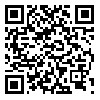Volume 20, Issue 4 (11-2021)
TB 2021, 20(4): 63-78 |
Back to browse issues page
Ethics code: IR.UM.REC.1400.026
Download citation:
BibTeX | RIS | EndNote | Medlars | ProCite | Reference Manager | RefWorks
Send citation to:



BibTeX | RIS | EndNote | Medlars | ProCite | Reference Manager | RefWorks
Send citation to:
Jalali R, Etemadfard H, Kharaghani H, Shad R, Sadeghi V. Prioritization and Allocation Model of COVID-19 Vaccine in Neighborhoods of Mashhad Using AHP and Fuzzy Logic. TB 2021; 20 (4) :63-78
URL: http://tbj.ssu.ac.ir/article-1-3203-en.html
URL: http://tbj.ssu.ac.ir/article-1-3203-en.html
FUM , etemadfard@um.ac.ir
Abstract: (2059 Views)
Introduction: The global outbreak of the COVID-19 in 2019, and the high mortality rate of the disease call for decision-making and finding a solution to control its spread. One of the most effective ways is to use the COVID-19 vaccine. Due to the limited supply of corona vaccines, the distribution of this vaccine is generally prioritized and allocated among individuals.
Methods: In this descriptive correlational study, GIS, AHP tools, and fuzzy logic were used to achieve the goal of prioritizing and allocating corona vaccine to the neighborhoods in Mashhad. Neighborhoods' prioritization was analyzed in four scenarios including: AHP, WHO guideline, guideline of the Ministry of Health and Medical Education of Iran, and localized collective wisdom.
Results: The output of neighborhood prioritization of the four mentioned scenarios has been specified in five classes. In the AHP scenario, the lowest percentage (8.89%), and in the localized collective wisdom , the highest percentage (42.22%) was allocated to the neighborhoods with the first priority. Regarding spatial distribution, only in the first scenario, some kind of order was observed. Furthermore, there is generally no high correlation between the results , and only the scenario of the Ministry of Health and Medical Education and the localized collective wisdom presented a correlation of 0.82.
Conclusion: Considering the COVID-19 vaccine shortage, spatial allocation based on the presented guidelines is a reliable method which can meet the basic criteria for allocating the limited treatment resources, and 180 neighborhoods throughout Mashhad were identified and prioritized with different scenarios which can assist the decision-makers.
Methods: In this descriptive correlational study, GIS, AHP tools, and fuzzy logic were used to achieve the goal of prioritizing and allocating corona vaccine to the neighborhoods in Mashhad. Neighborhoods' prioritization was analyzed in four scenarios including: AHP, WHO guideline, guideline of the Ministry of Health and Medical Education of Iran, and localized collective wisdom.
Results: The output of neighborhood prioritization of the four mentioned scenarios has been specified in five classes. In the AHP scenario, the lowest percentage (8.89%), and in the localized collective wisdom , the highest percentage (42.22%) was allocated to the neighborhoods with the first priority. Regarding spatial distribution, only in the first scenario, some kind of order was observed. Furthermore, there is generally no high correlation between the results , and only the scenario of the Ministry of Health and Medical Education and the localized collective wisdom presented a correlation of 0.82.
Conclusion: Considering the COVID-19 vaccine shortage, spatial allocation based on the presented guidelines is a reliable method which can meet the basic criteria for allocating the limited treatment resources, and 180 neighborhoods throughout Mashhad were identified and prioritized with different scenarios which can assist the decision-makers.
Type of Study: Applicable |
Subject:
General
Received: 2021/05/2 | Accepted: 2021/07/4 | Published: 2021/11/1
Received: 2021/05/2 | Accepted: 2021/07/4 | Published: 2021/11/1
Send email to the article author
| Rights and permissions | |
 |
This work is licensed under a Creative Commons Attribution-NonCommercial 4.0 International License. |







